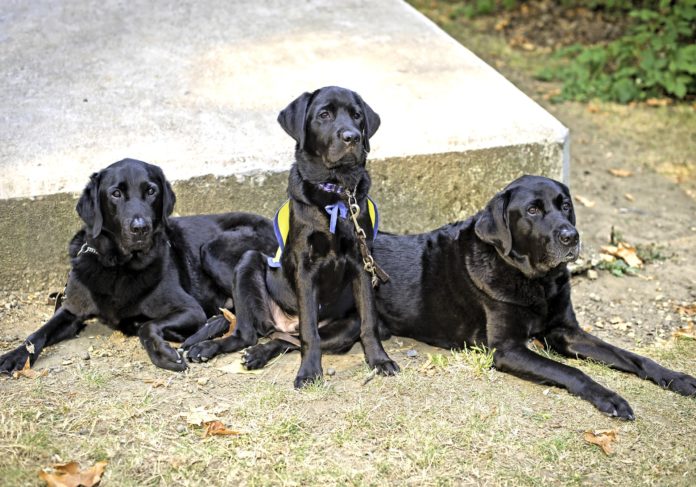CORRECTION
In The Tribune’s Aug. 27, 2019 article, “Understanding Alabama’s service dog laws,” we stated that service animals and service animals in training are required to wear harnesses or leashes with visible lettering identifying them as service animals. That requirement actually applies only to animals in training and NOT to animals in active service. Visible identification of an active service dog could, in fact, violate the Americans with Disabilities Act. We regret the error.
MONTGOMERY, Ala. – Among the first topics of conversation at last week’s legislative community forum in West Point was the legal status of dogs in retail establishments, based on a question from an audience member who had observed a shopper enter a local Wal-Mart with a dog on a leash, then unleash the animal to let it wander the grocery aisles. Another audience member claimed that retail employees are not even allowed to ask whether that roving pooch is actually a service animal.
The Tribune investigated the matter and discovered an act (Senate Bill 10, enacted as Act 2019-478) passed in the 2019 Alabama legislative session that amends current state law (Alabama Code 21-7) concerning service animals. The amended law offers useful definitions, explains several issues and sets forth new penalties for people who falsely claim pets as service animals.
What is a service animal?
The act and updated code define a service animal as “an animal that is trained to do work or perform tasks for an individual with a disability. The work done or tasks performed shall be directly related to the disability of the individual and may include, but are not limited to, guiding an individual who is visually impaired or blind, alerting an individual who is deaf or hard of hearing, pulling a wheelchair, assisting with mobility or balance, alerting and protecting an individual who is having a seizure, retrieving objects, alerting an individual to the presence of allergens, providing physical support and assistance with balance and stability to an individual with a mobility disability, helping an individual with a psychiatric or neurological disability by preventing or interrupting impulsive or destructive behaviors, reminding an individual with mental illness to take prescribed medications, calming an individual with post-traumatic stress disorder during an anxiety attack, doing other specific work, or performing other special tasks. This shall include a dog owned, used, or in training by any police or fire department, rescue or first response squad, ambulance corps, or search and rescue organization for the purpose of locating criminal and lost persons, or detecting illegal substances, explosives, cadavers, accelerants, or school or correctional facility contraband. A service animal may not be a pet. For the purposes of Sections 21-7-3, 21-7-4, and 21-7-5, the term ‘service animal’ shall be limited to a dog or a miniature horse. The crime-deterrent effect of the presence of an animal and the provision of emotional support, well-being, comfort, or companionship may not constitute work or tasks for the purposes of this definition.”
An “individual with a disability” is defined as “A person who has a physical or mental impairment, including a physical, sensory, psychiatric, intellectual, or other mental disability, that substantially limits one or more major life activities of the individual.”
Note that the Code’s definition does not include security, emotional support or companion animals, nor does it include pets or any animals other than trained dogs and horses.
Rights of disabled persons with service animals
According to the law, “An individual with a disability has the right to be accompanied by a service animal in any public place all areas of a public accommodation, including a public or private school, and any of the places listed in Section 21-7-3 that the public or customers are normally permitted to occupy.”
Those “places” include “A common carrier, airplane, motor vehicle, railroad train, motor bus, streetcar, boat, or other public conveyance or mode of transportation, a hotel, a timeshare that is a transient public lodging establishment, a lodging place, a place of public accommodation, amusement, or resort, and other places to which the general public is invited, subject only to the conditions and limitations established by law and applicable alike to all persons.”
A person who is approved to train service animals has the same rights of access while training a new animal.
Responsibilities of persons with service animals
So, can a customer turn his service dog loose to roam the grocery aisles? The law says no.
According to the Code: “A service animal shall be under the control of its handler and shall have a harness, leash, or other tether, unless either the handler is unable because his or her disability prevents him or her from the use of a harness, leash, or other tether, or the use of a harness, leash, or other tether would interfere with the safe, effective performance of work or tasks by the service animal, in which case the service animal shall be otherwise under the control of the handler by means of voice control, signals, or other effective means.”
The law also says: “An individual with a disability is liable for damage caused by a service animal if it is the regular policy and practice of the public accommodation to charge a person who is not disabled for damages caused by a pet.
“The care or supervision of a service animal is the responsibility of the individual owner of the service animal.
- A public accommodation may not be required to provide care or food or a special location for a service animal or assistance with removing animal excrement.
- A public accommodation may exclude or remove an animal from the premises, including a service animal, if the animal is out of control and the handler of the animal does not take effective action to control the animal, the animal is not housebroken, or the behavior of the animal poses a direct threat to the health and safety of others.”
Can store employees ask?
Well, yes and no. According to the law, a person does not have to present proof that the animal is a certified service animal, and employees are limited in the questions that they can ask.
The law says, “Documentation that the service animal is trained is not a precondition for providing service to an individual accompanied by a service animal,” and “A public accommodation may not ask about the nature or extent of the disability of an individual.”
Employees can ask certain questions, though:
“To determine the difference between a service animal and a pet, a public accommodation may ask if an animal is a service animal required because of a disability and what work or tasks the animal has been trained to perform.”
Service animals in training are required to wear special harnesses, backpacks or other accessories containing wording readable from at least 20 feet away that identifies them as service animals in training.
To identify animals in training, employees may ask:
- “If a trainer is an owner trainer with a disability or a qualified trainer with at least one year’s experience training animals.
- “For photo identification stating that the trainer is an employee, volunteer, agent, or graduate of a school for seeing eye, hearing, service, or guide dogs or an organization generally recognized by agencies involved in the rehabilitation of persons with disabilities as reputable and competent to provide dogs with training, and who is actually involved in the training process.
- “What task the animal is being trained to perform, and if the trainer is currently engaged in the training of the animal.”
Fake service animals, real trouble
Unfortunately, service dog harnesses and animal IDs are not regulated and can be purchased from numerous online sources, making fake service animals a growing problem. The 2019 act responds to the issue by stating:
“A person who knowingly and willfully misrepresents himself or herself, through conduct or verbal or written notice, as using a service animal and being qualified to use a service animal or as a trainer of a service animal is guilty of a Class C misdemeanor, and in addition to any fines and penalties provided by law, shall perform 100 hours of community service for an organization that serves individuals with disabilities, or for another entity or organization, at the discretion of the court, to be completed in not more than six months.”
A subsequent infraction is a class B misdemeanor and carries a $100 fine.
To read the full act, visit https://legiscan.com/AL/text/SB10/2019.
Copyright 2019 Humble Roots, LLC. All Rights Reserved.





























